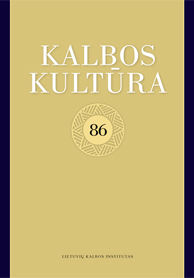Iš vardų ir pavardžių rašymo dokumentuose istorijos
From the History of Spelling of First Names and Surnames in Documents
Author(s): Pranas KniūkštaSubject(s): Baltic Languages
Published by: Lietuvių Kalbos Institutas
Keywords: resolution of the Supreme Council; spelling of names and surnames; Lithuanian characters; draft regulations;
Summary/Abstract: The fundamental principles for the spelling of first names and surnames in documents were established by the resolution of the Supreme Council of the Republic of Lithuania dated 31 January 1991 on the spelling of first names and surnames in the passports of citizens of the Republic of Lithuania. The key principle stipulated in the resolution maintains that first names and surnames of the citizens of the Republic of Lithuania must be written in Lithuanian characters. The same principle applies to the Lithuanian citizens of non-Lithuanian descent,only they can choose whether to write their first names and surnames with a Lithuanian ending or without it.The resolution was directly applicable to passports but failed to cover other documents as well as all the cases of spelling of personal names. Therefore, the employees of institutions issuing documents, mostly passport divisions and civil registry offices, used to face various questions. Their requirement for the drafting of more extensive guidelines for the spelling of first names and surnames or a differently titled description of such type became increasingly intense.The description was drafted at the end of 1995 under the title “Regulations of Spelling of First Names and Surnames in Personal Documents”. They were considered by the experts of the State Commission of the Lithuanian Language for several times; afterwards, they were distributed among ministries and institutions for acquaintance. The draft regulations corrected in line with the feedback received were further considered and approved by the State Commission of the Lithuanian Language. Whereas the regulations are not only concerned with language but also legal issues, the State Commission of the Lithuanian Language passed them for the approval of the Seimas; however, the approval of the regulations was not undertaken by the Seimas. The spelling of first names and surnames in documents does not cause greater uncertainties and misunderstandings. Confusion is only due to the citizens of Polish descent, dissatisfied that their surnames are written in Lithuanian characters in documents in the manner identical to other Lithuanian citizens. Claims are also brought up by Poland, wishing to impose its requirement by a crossborder agreement and expressing an almost open demand to revoke the resolution of the Supreme Council.The Government failed to withstand the pressure by producing unconstitutional draft laws for a couple of times (in 2007 and 2010), enabling the spelling of surnames of the citizens of the Republic of Lithuania in non-Lithuanian characters. However, these draft laws were rejected by the Seimas.
Journal: Bendrinė kalba (iki 2014 metų – Kalbos kultūra)
- Issue Year: 2013
- Issue No: 86
- Page Range: 50-59
- Page Count: 10
- Language: Lithuanian

